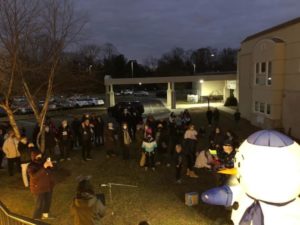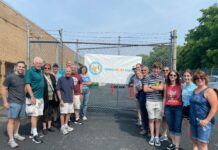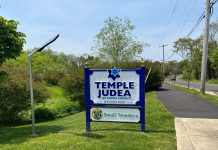Temple Judea of Bucks County in Doylestown was victimized by a Zoom bombing during a Shabbat service on Jan. 7.
While the gathering was taking place, the intruder entered and started writing antisemitic, racist and homophobic comments in the chat section. The “unwelcome participant,” as a Temple Judea email described the intruder, also drew “an offensive image on a shared slide containing a healing prayer.”
Synagogue leaders shut down the meeting and reentered to complete the service. But the damage was done.
Days later, Temple Judea Rabbi Sigal Brier and President Len Saffren sent out an emailed statement explaining the incident to other Bucks County rabbis, cantors and Jewish organizations, including the Bucks County Kehillah, part of the Jewish Federation of Greater Philadelphia.
“We still feel the pain and shock of it all as we write this. Our community is shaken by this breach,” they said. “We are doing our best to support each other, to heal and to mend.”
Also in their email, Brier and Saffren said they reported the incident to “several organizations” and were “reaching out for support outside the organization.” They filed a police report to the Doylestown Township Police Department on Jan. 11, according to the department.
Toward the end of their statement, the synagogue leaders alluded to “antisemitism and hate rhetoric in Central Bucks” more generally.
At a Central Bucks School Board meeting last November, a man used his three minutes during public comment to spew antisemitic falsehoods. His rhetoric, and hate speech in general, was condemned by school district leaders at the following board meeting in December.
Temple Judea’s rabbi and president explained that antisemitic attacks would not stop them from carrying on.
“We are committed to protecting our right to exist and to continue to carry on the Jewish legacy, to express and celebrate Judaism in community and in the public square,” they said.
“The public square” now includes the digital space, and Zoom more specifically, according to other Bucks County rabbis who received that email.
Several synagogue leaders said that they use Zoom for Shabbat and other services, too, and have been since the pandemic began. It became necessary due to lockdown policies then, but it has become a convenient tool for helping people attend services ever since.
During this time, Zoom bombings have become a new, unanticipated threat.

Ohev Shalom of Bucks County in Richboro faced one in 2020 shortly after opening Shabbat services in the digital space.
According to Rabbi Eliott Perlstein, the attacker “got a line in and was done.” Perlstein and Ohev leaders kicked the intruder out and resumed the service. Ohev congregants didn’t even have to leave and come back in.
The anguish from the event was difficult, to be sure. It was difficult enough for Perlstein to stay on after that service to see if anyone needed to talk through what happened.
“It’s terribly disturbing,” he said.
But as Perlstein explained, nobody got physically injured. So despite the anguish, the threat of a Zoom bombing is not dangerous enough to outweigh the benefits of Zoom services.
Virtual reality brings people together who may not have been able to get together in person.
“The benefits vastly outweigh the risks,” said Rabbi Anna Boswell-Levy of Congregation Kol Emet in Yardley.
But congregations can’t ignore the risks, according to Perlstein and Boswell-Levy. Virtual services have become yet another domain in which Jews need to protect themselves.
Since that 2020 Zoom bombing, Ohev Shalom requires participants to state their names and reasons for attending before they enter. Those questions are not foolproof, as an outsider can still make up a good story. But for service leaders, it does help clarify the judgment call about whether to let the person in.
They also allow the synagogue to stay open to outsiders who genuinely want to pray.
“Usually, there’s a reason why that person is joining us,” Perlstein said. “Like there’s a person who had a loss in their family.”
Kol Emet leaders don’t share the Zoom service link in a prominent place on their website. Instead, they email it to congregants in the weekly newsletter and embed it in an event link on the synagogue’s website calendar.
The Reconstructionist institution also uses a Zoom with a password and a waiting room. If an unfamiliar name enters the waiting room, Boswell-Levy and her fellow leaders ask the same questions that Ohev Shalom leaders ask.
“So far that approach has worked,” she said. “If it’s not enough, it might change.”
[email protected]; 215-832-0740







Please explain Reconstructionist Judeism.